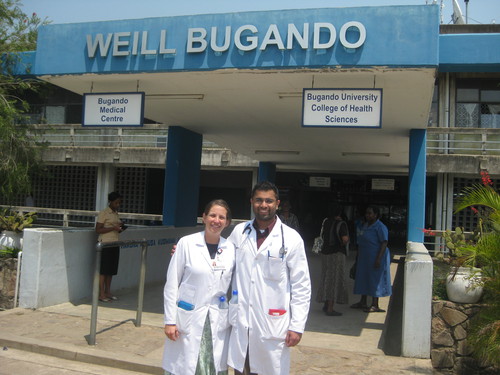Jill Blumenthal - Weill Bugando
Dr. Jill Blumenthal (PGY-3 Internal Medicine) completed a rotation at Weill Bugando in Mwanza, Tanzania in January 2011.
 Dr. Jill Blumenthal and Dr. Raja Taunk at Weill Bugando Medical Center
Dr. Jill Blumenthal and Dr. Raja Taunk at Weill Bugando Medical Center
During my last week in Tanzania, I had the pleasure of meeting a visiting anesthesiologist from the Medical University of South Carolina and his wife Barbara. Barbara is a journalist and former reporter and naturally wanted to know about my five weeks at Bugando. Instead of asking the standard “how was your experience?,” she asked more pointed questions like a good journalist would, which allowed me to think about my experience working in a hospital in a developing nation in a different way.
As I reflected, I realized that even in my short stay in Mwanza, I had gone through the stages of grief as described by Elisabeth Kubler-Ross. At first it was hard to believe that what I was feeling was akin to how a person deals with grief and tragedy. And it seemed unfair to equate working in a developing nation to catastrophic personal loss. What I discovered, however, was that the model is easily applied to significant life events. Working at Bugando was for me a significant life event.
In the Kubler-Ross model, the five stages—denial, anger, bargaining, depression and acceptance—are part of the construct that makes up one’s learning to live with loss. In this case, they were tools to help me frame and identify what I was feeling when confronted with working in a challenging environment with often devastating outcomes. Perhaps I was feeling a tangible loss of the medical system I was used to, one with abundant resources where basic health care needs are met.
Throughout my first week in the hospital, I kept thinking to myself that it really wasn’t so bad. There seemed to be a lot of staff, there were empty beds on the floors, HIV rapid tests were being done. A patient could even get an echocardiogram on the same day it was ordered! I was impressed for a few days but that feeling slowly trickled away from me. Things were bad. Patients were dying around me, but I was slow to see it because I was in denial. As this is only a temporary defense, I did not remain in denial for long.
The next stage, anger, came on quickly and seemed to linger. And I was angry at many things—at the residents for not transferring a patient to the ICU sooner, at the interns for not getting a lab value, at the nurses for running the IVF too slowly, at the nurses’ aide for letting a small child roll out of bed. But most of all, I was angry about what was happening in this hospital. How could this be allowed to happen? How could the delivery of health care be so dramatically different in the US? And who is to blame? Without being able to answer these questions, I tried to figure out a way to deal with my anger, and towards the end of my third week the negotiations began.
 Dr. Manan Shah, gastroenterologist, teaches the basics of endoscopy.
Dr. Manan Shah, gastroenterologist, teaches the basics of endoscopy.
Bargaining in some ways became a form of rationalization for what I was seeing. I began to think that if I could do certain things while I was here, I would be able to make important changes. I understood that the situation was dire but if I was able to figure something out about the system that had not yet be elucidated, maybe I could make a more meaningful difference. There was also the subliminal negotiation for time, knowing that I would only be at Bugando for a few weeks but thinking that more time could impart more significant impact.
Once I realized that I could not get any more time, I slipped into a brief period of depression. I felt so sad about the state of the hospital that it didn’t feel like there was anything to do. I felt that many of my efforts were for naught so what was the point? Fortunately, this short-lived depression disappeared and made way for the final and still present stage of acceptance. For me, it’s an acceptance of the way things are in a resource-limited setting where there are layers of complexities that I cannot even begin to comprehend. But it’s not an acceptance of the system being this way forever. It’s an acknowledgement that it is this way for multiple reasons and the understanding that change, albeit slow, is occurring. Finally, it’s an acceptance of the personal transformation now underway that will help shape the kind of physician I will become and how I will practice medicine going forward.
Weill Cornell Medicine Center for Global Health
Center for Global Health
420 East 70th Street, 4th Floor, Suite LH-455
New York, NY 10021
Phone: (646) 962-8140
Fax: (646) 962-0285

